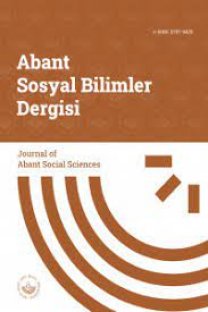Öğretmen Adaylarının Üst Biliş Düzeylerinin Belirlenmesi
-
-
-,
___
- Açıkgöz, K.Ü. (2000). Etkili Öğrenme ve Öğretme (Üçüncü Baskı). Kanyılmaz Matbaası: İzmir.
- Açıkgöz, K.Ü. (2002). Aktif Öğrenme (Birinci Baskı). Eğitim Dünyası Yayınları: İzmir.
- Baird, J.R., & Mitchell, I.J. (1986). Improving The Quality of Teaching and Learning: An Australian Case Study -The PEEL Project. Melbourne: Monash University.
- Baird, J.R., & Northfield, J.R. (1992). Learning from the PEEL Experience. Melbourne: Monash University.
- Beeth, M.E. (1998). Teaching for Conceptual Change: Using Status as a Metacognitive Tool. Science Education, 82:343–356.
- Blank, L.M. (2000). A Metacognitive Learning Cycle: A Better Warranty for Student Understanding?. Science Education, 84: 486–506.
- Butler, D.L., & Winne, P.H. (1995). Feedback and Self-Regulated Learning: A Theoretical Synthesis. Review of Educational Research, 65(3), 245–281.
- Crotty, T. (1994). Integrating distance learning activities to enhance teacher education toward the constructivist paradigm of teaching and learning. In Distance learning research conferece proceeding (pp.31-37). College Station, TX: Department of education and Human resource Development, Texas A & M University.
- Cooper, M., Urena, S., S. & Stevens, R. (2008). Reliable mutli method assessment of metacognition use in chemistry problem solving, Chemistry Education Research and Practice, 9, 18-24
- Eggen, P. ve Kauchak, D. (2001). Educational Psychology, New Jersey, USA
- Flavell, J.H. (1987). Speculations about the Nature and the Development of Metacognition. In F.E. Weinert & R.H. Kluwe (Editörler), Metacognition, Motivation, and Understanding (21-29). Hillsdale, NJ: Lawrance Erlbaum Associates, Publishers.
- Gauld, C. (1986). Model, Meters and Memory. Research in Science Education, 16: 49- 54.
- Georghiades, P. (2004). Making Pupils‟ Conceptions of Electricity More Durable By Means Of Situated Metacognition, International Journal of Science Education, 26 (1), 85-99.
- Gunstone, R.F., & Mitchell, I.J. (1998). Metacognition and Conceptual Change. In J.J. Mintzes, J.H. Wandersee & J.D. Novak (Editörler) Teaching Science for Understanding: A Human Constructivist View (133-163). San Diego: Academic Press.
- Karasar, N. (2000). Bilimsel Araştırma Yöntemleri, Ankara: Nobel Yayın Dağıtım
- Kimmel, M.S. (2000). The gender society. Oxford University press.
- Kirby, J.R., & Ashman, A.F. (1984). Planning Skills and Mathematics Achievement: Implications Regarding Learning Disability. Journal of Psychoeducational Assessment, 2:9-22.
- Lowe, P.A., Mayfield, J.W., & Reynold, C.R. (2003). Gender differences in memory test performance among children and adolescent. Archives of Clinical Neuropsychology, 18; 865-878.
- Maccoby, E.E., & Jacklin, C.N. (1974). The psychology of sex differences. Stanford: Stanford University Press.
- Martinez, M.E. (2006). What Is Metacognition? Phi Delta Kapan, 67; 696-699
- MEB (2005). İlköğretim Fen ve Teknoloji Dersi (6, 7 Ve 8. Sınıflar ) Öğretim Programı. 21 Eylül 2005, http://ttkb.meb.gov.tr/anasayfa.htmadresinden indirilmiştir.
- Paris, S.G., & Jacobs, J.E. (1984). The Benefits of Informed Instruction for Children's Reading Awareness and Comprehension Skills. Child Development, 55: 2083- 2093.
- Rhode, D.L. (1990). Theoretical perspectives on sexual difference. In D. L. Rhode (Ed.), Theoretical perspectives on sexual difference (pp. 1-9). New Haven and London: Yale University pres.
- Spence, J.D., Yore, D.L & Williams, R.L. (1999). The effects of Explicit Science reading Instruction on selected grade 7 Students‟ metacognition and Comprehension of Specific Science Text. Journal of Elementary Science Education, 11: 15-30.
- Thomas, G.P., & McRobbie, C. J. (2001). Using a Metaphor for Learning to Improve Students‟ Metacognition in the Chemistry Classroom. Journal of Research in Science Teaching, 38: 222–259.
- Victor, A.M. (2004). The Effects of Metacognitive Instruction on the Planning and Academic Achievement of First Grade and Second Grade Children. Yayınlanmamış Doktora Tezi. Illinois Institute of Technology, 23.02.2005 tarihinde ProQuest Digital Dissertations‟tan alınmıştır.
- Yıldız, E.,. ve Ergin, Ö. (2007). Bilişüstü ve Fen öğretimi GÜ, Gazi Eğitim Fakültesi Dergisi, 27(3), 175-196.
- Zion, M., Michalsky, T., & Mevarech, Z.R. (2005). The effects of metacognitive instruction embedded within an asynchronous learning network on scientific inquiry skills, International Journal of Science Education, 27; 957-983.
- Yayın Aralığı: 3
- Başlangıç: 2000
- Yayıncı: Abant İzzet Baysal Üniversitesi Sosyal Bilimler Enstitüsü
Yeniçağa İlçesi ve Dereköy’de Geleneksel Kadın Kıyafetleri ve Süslemeleri
Fatma YETİM, Hülya Köklü, Melda Özdemir
Orta Doğu Ülkelerinin Türk Dış Politikasına Bakışı: Gazze Savaşı Bağlamında Bir Analiz
Öğretmen Adaylarının Üst Biliş Düzeylerinin Belirlenmesi
Cengiz TÜYSÜZ, Yunus Karakuyu, İbrahim Bilgin
Bolu Ağzında Yemek Kültürüyle İlgili Kelimeler
Türkçe İlk Alfabe Kitabı Nuhbetü’l-Etfâl’de Türkçe Öğretim Metodu ve Günümüzdeki Bazı Uygulamalar
